The fate of a nation hangs in the balance as Iran braces for a political showdown.
In mere days, the runoff phase of Iran's presidential election will take place, with two contenders vying for the keys to the president's office in Tehran.
This report, part of a series of articles about the runoff election, rips open the battle plans of the final contenders.
In one corner stands pro-reform Masoud Pezeshkian. On the other, Saeed Jalili, a hardliner from the Front of Islamic Revolution Stability.
Women, Morality Police, and Hijab
| Pezeshkian | "My government would oppose the Morality Police, and I stand firmly against any form of coercion against any human being. We have no right to coerce women and girls, and I am ashamed of these behaviors towards them." |
| Jalili | "The hijab represents the social presence of women. Western civilization has reached a dead end in addressing women's issues. Women are the strength behind the Islamic revolution." |
Masoud Pezeshkian has openly expressed his opposition to the forced enforcement of hijab on women.
He believes it is neither possible to remove a headscarf from a woman's head forcibly nor force one on.
He says, "I am religiously opposed to any kind of coercion or harsh treatment of any human being."
Reflecting on the encounters girls and women face on the streets, he notes that protesting these behaviors sometimes leads to repercussions.
He emphasizes that "girls and women are our own, not foreigners, and instead of self-criticism for why this has happened, we are improperly dealing with them."
The pro-reform candidate expresses shame over such incidents, saying, "We cannot change behavior by force, order, and law, just as in the past they could not forcibly remove the hijab from our women's heads.
"We will not be able to cover women's heads through coercion. Our current behavior only complicates matters for girls and young people. We have no right to force students, girls, and women regarding citizenship rights."
Pezeshkian has provided a written guarantee that the entire government will stand against the Morality Police in all meetings and at all times.
In contrast, Saeed Jalili, a candidate from the Islamic Revolution Front, holds a different viewpoint.
He believes that "the hijab is a woman's social dress to preserve and strengthen the privacy of the family."
Jalili views women as the strong point of the Islamic revolution, stating that "women, through hijab and modesty, showcase a precise and effective example to the world in various fields."
Criticizing the protests by Western leaders regarding Mahsa Amini's death in custody for wearing her headscarf "improperly", Jalili says: "Those who are silent today about the killing of tens of thousands of women in Gaza and Palestine, and instead take souvenir photos with the killers, suddenly become very active in the issue of women in Iran.
"From Mr. Macron to Mr. Biden, why? Because they witness that if our country has succeeded both in the field of resistance and in the field of progress, it is due to the power of a new model that has shown the world a model that has amazed them."
Plans for Addressing Women's Rights and Inequality
| Pezeshkian | "We must teach equality between women and men from childhood. I am actively pursuing women's security law and will work to eliminate the second-class status of women in positions of authority and the economic sphere." |
| Jalili | "All women, including housewives and heads of households, should be recognized and valued. My government would have initiatives to strengthen families, such as providing travel opportunities and food baskets." |
Pezeshkian advocates for teaching children about gender equality from an early age.
He emphasizes, "For me, the first step starts from school and kindergarten. At this stage, we will teach children equal views and capabilities."
Pezeshkian shares that his late wife, a doctor, equally shared household responsibilities and professional duties.
"We grew together and worked together, and this belief has been mutual from the beginning," he says.
Highlighting the stalled bill in parliament aimed at ensuring women's security and preventing violence against women, Pezeshkian vows to pursue its completion.
"I respect women and will demonstrate this respect through actions. We must change our view that women are secondary due to gender and are merely for the family; women are equals in the economy, industry, science, and efficiency. We must grant them appropriate positions and practically prove this stance."
Jalili sees women's concerns only as recognizing their roles and positions.
"Women are the essence of Iran, and we must define their roles comprehensively. Why is the role of housewives overlooked?" he asks.
Jalili argues that by creating safe and peaceful home environments, homemakers have raised youth who contribute to the nation's progress and have prevented social issues like addiction, suicide, and depression.
He questions, "If the government aimed to achieve such results with its employees, how many would it need to hire? Shouldn't this role be acknowledged, appreciated, and supported?"
He further asserts that many expenses aimed at addressing social harms or educating the youth yield minimal results compared to the outcomes achieved by mothers.
"We should allocate resources here. We have a plan for that," he adds.
Jalili believes the government should have a family-centered plan, proposing initiatives like travel and food baskets to strengthen family bonds.
Internet Restrictions and Filtering
| Pezeshkian | "The government opposes internet filtering and restrictions. We must ensure free access to the internet. I am firmly against the imposed bans and committed to developing the necessary infrastructure to support this freedom." |
| Jalili | "I salute the experts who have actively engaged with the issue of the internet rather than passively dealing with it; they have harnessed and governed it effectively. Supporting domestic messaging platforms is crucial." |
Jalili does not promise to remove internet filtering but advocates for intelligent, transparent, legally sound, and impartial accountability for both domestic and foreign platforms.
He asserts that "social media, like physical space, is integral to people's lives, and the government's role is to maximize opportunities while minimizing threats."
He emphasizes the right of individuals to have their data protected and to prevent fraud on the internet, stating that freedom must come with responsibility.
Jalili commends "scientists and experts who actively engage with social media issues rather than passively dealing with them," highlighting the importance of domestic messaging platforms.
Pezeshkian emphasizes that internet filtering and restrictions have had detrimental effects on businesses, leading to job losses and significant emigration from the tech sector.
He asserts, "As president, I will unequivocally oppose the bans that have provoked public discontent and devastated many online businesses."
Pezeshkian argues that the accessibility of explicit content has increased due to VPNs.
He advocates for government management of cyberspace to both prevent users from accessing inappropriate content and ensure freedom of internet usage.
Pezeshkian critiques the current state of internet infrastructure, likening it to a freeway with frequent barriers every few meters, which he believes frustrates internet users.
"To remain competitive in science, civilization, and artificial intelligence, we must prioritize global internet connectivity while maintaining security measures," Pezeshkian states.
He expresses concern that insufficient infrastructure forces scientists to leave the country, underlining the need to retain and support them.
Pezeshkian pledges to develop robust internet infrastructure and guarantees that his administration will staunchly oppose internet filtering and the sale of VPNs, aiming to create a conducive environment for cyberspace activists in the country.
Art and Culture
| Pezeshkian | "We must eliminate the barriers that force artists into underground productions. I advocate for quality assessments in cultural endeavors. I am committed to restoring autonomy to cinema and theater and ensuring the cultural space's security." |
| Jalili | "The cultural director should ideally be a dedicated consumer of cultural products. During Nowruz and in contexts of resistance and Islam, there is ample opportunity for cultural exchange." |
Pezeshkian presents pledges that his government will prioritize culture without imposing governmental control over it.
He addresses several critical cultural challenges:
"Iranian films at this year's Cannes festival were either underground or made outside of Iran. I aim to change this situation and remove obstacles that force filmmakers into underground productions."
"Books are prohibitively expensive. To promote reading, we must ensure affordable access to books and reform the education system to cultivate a culture of reading among our students."
"We need to revise conditions so that cinematographers are neither prevented from leaving the country nor restricted from working within Iran."
"The government should shift from interventionism to policymaking and oversight, granting autonomy to theaters and cinemas."
Regarding the creation of cultural identity, Pezeshkian argues, "Culture is nurtured not by governments alone, but also by places like seminaries, mosques, and community centers. Regardless of political leanings, projects like Mehr houses lack essential cultural facilities such as mosques, schools, and recreational spaces, contributing to societal challenges."
On the other hand, Jalili asserts, "Through the infrastructure and human resources established during the Islamic Revolution, we possess valuable assets for cultural production, which external forces seek to hinder."
"Similar to efforts in nuclear and industrial sectors, America also targets our artistic endeavors."
Jalili emphasizes, "A cultural manager should understand poetry, literature, film, and media to avoid errors."
"The global community is eager to engage with us, especially during Nowruz and in the context of resistance and Islam."




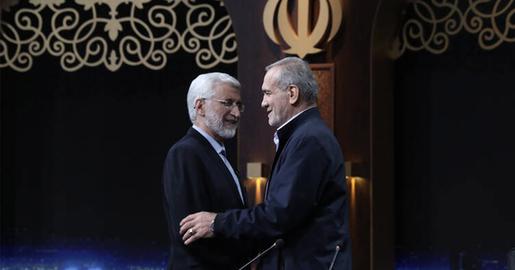







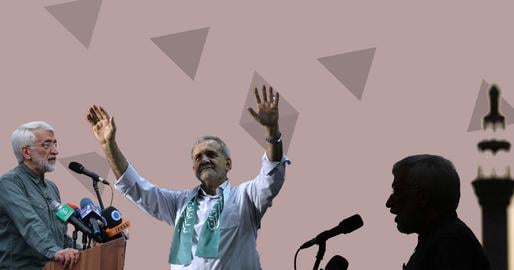
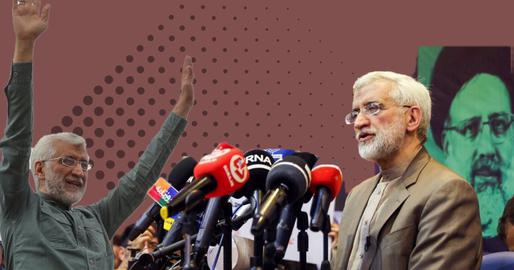

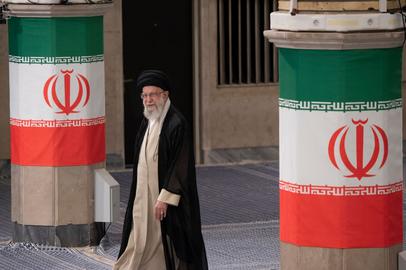

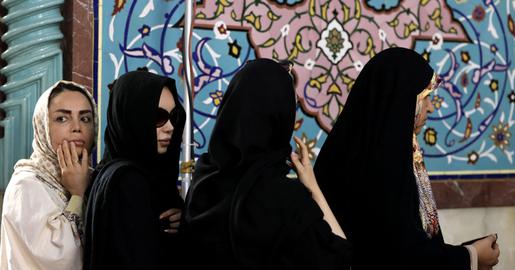







comments